Canadians expect bold action to deal with the economic and social impact of the pandemic
September 15, 2020
Earlier this month, the Broadbent Institute commissioned us to conduct a national public opinion survey to explore the kind of recovery agenda Canadians want the federal government to set in response to the pandemic.
The survey found:
1. Almost half (45%) think the worst of the pandemic is still to come and only 19% think the worst is behind us.
2. Most Canadians believe the pandemic has had negative impacts on many aspects of life, including the availability of good-paying jobs, the ability to prepare for retirement, housing affordability, and wealth and income inequality in Canada.
3. Almost all Canadians (82%) believe that the wealth of Canada’s richest people is better off or has not been impacted by the pandemic while most think the economic and social well-being of youth, racialized Canadians, and women have been negative impacted.
4. 65% of Canadians believe “the pandemic has highlighted problems with how the economy and social policies are run in Canada and major changes are needed to ensure that these problems do not happen again if there is another crisis like the COVID-19 pandemic.”
5. Given this, half of Canadians want to see the federal government announce bold new ideas for how to fundamentally improve people’s lives and deal with climate change. 36% want the federal government to announce some changes, but nothing that fundamentally changes how things are done. 10% want the government to keep the direction it set before the pandemic and change very little.
6. There is a broad and deep desire from Canadians to see a post-COVID recovery agenda that helps make Canada more self-sufficient on manufacturing/growing key products, puts people first, improves public services, helps transition to a low-carbon economy, and forces the richest in Canada to help pay for the new investments.
Here are more detailed findings from the survey:
WE AREN’T OUT OF THE WOODS YET: 45% THINK THE WORST OF THE PANDEMIC IS STILL TO COME
Almost half of Canadians remain pessimistic about the outlook for the pandemic. 45% think the worst is still to come, while only 19% feel the worst of the pandemic is behind us. The remaining 36% are not sure about the outlook.
This uncertainty and unease underscore the public’s mood about the pandemic, its impact, and how they want governments to respond to a post-COVID recovery.

FROM JOBS TO INEQUALITY, TO HOUSING: CANADIANS BELIEVE THE PANDEMIC HAS MADE MANY THINGS WORSE.
The survey asked respondents whether the COVID-19 pandemic has made several aspects of life and particular groups in society better or worse off.
A majority of Canadians believe the pandemic has made things worse when it comes to:
• The availability of good paying, secure jobs (70% worse).
• The ability of people to plan for a secure retirement (68% worse).
• Income and wealth inequality (62% worse).
• The available of affordable and high-quality childcare (59% worse).
• The affordability of housing (58% worse).
Canadians also recognize that particular groups have been negatively impacted by the pandemic.
About a majority believe:
• The opportunities for young people have become worse because of COVID-19 (64%).
• The health and well-being of front-line workers in healthcare, retail, and other service sectors is worse because of COVID-19 (54%).
• The economic and social well-being of racialized or visible minority communities is worse because of COVID-19 (55%).
• The economic and social well-being of women is worse because of COVID-19 (49%).
In contrast, almost all Canadians (82%) believe that the wealth of Canada’s wealthiest people is better or has not been impacted by the pandemic. In fact, 31% think Canada’s richest people are better off because of the pandemic. Only 18% think they are worse off.

MAKE MAJOR CHANGES NOW TO PREVENT THIS FROM HAPPENING AGAIN. 2 IN 3 CANADIANS THINK MAJOR CHANGES TO HOW THE ECONOMY AND SOCIAL PROGRAMS RUN TO ENSURE THE PROBLEMS THE PANDEMIC HIGHLIGHTED DON’T HAPPEN AGAIN.
65% of Canadians believe “the pandemic has highlighted problems with how the economy and social policies are run in Canada and major changes are needed to ensure that these problems do not happen again if there is another crisis like the COVID-19 pandemic.” Only 19% think the “way the Canadian economy and social policies worked before the pandemic was good and does not need major change.”
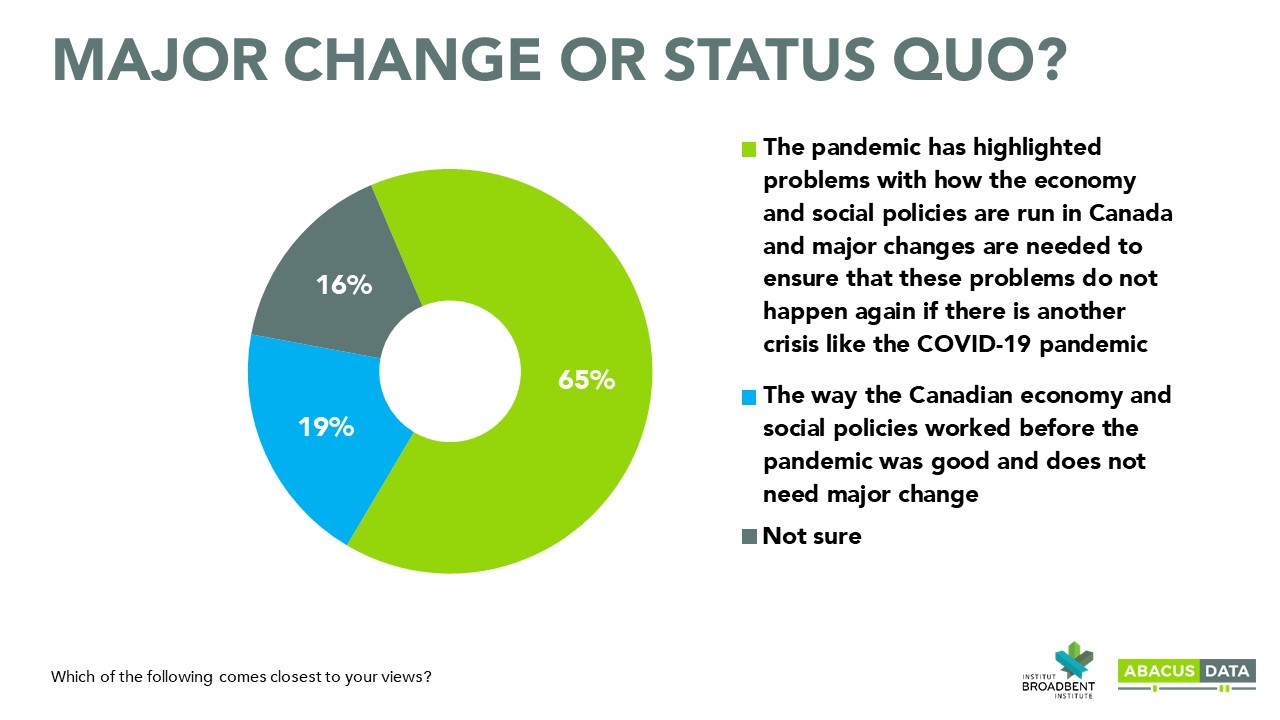
The desire for major changes is consistent across Canada, across age groups and gender and even across the political spectrum. 62% of Liberal voters, 69% of Conservative voters, and 72% of NDP voters want to see a major change.
Given this, half of Canadians want to see the federal government announce bold new ideas for how to fundamentally improve people’s lives and deal with climate change. 36% want the federal government to make some changes, but nothing that fundamentally changes how things are done. 10% want the government to keep the direction it set before the pandemic and change very little.
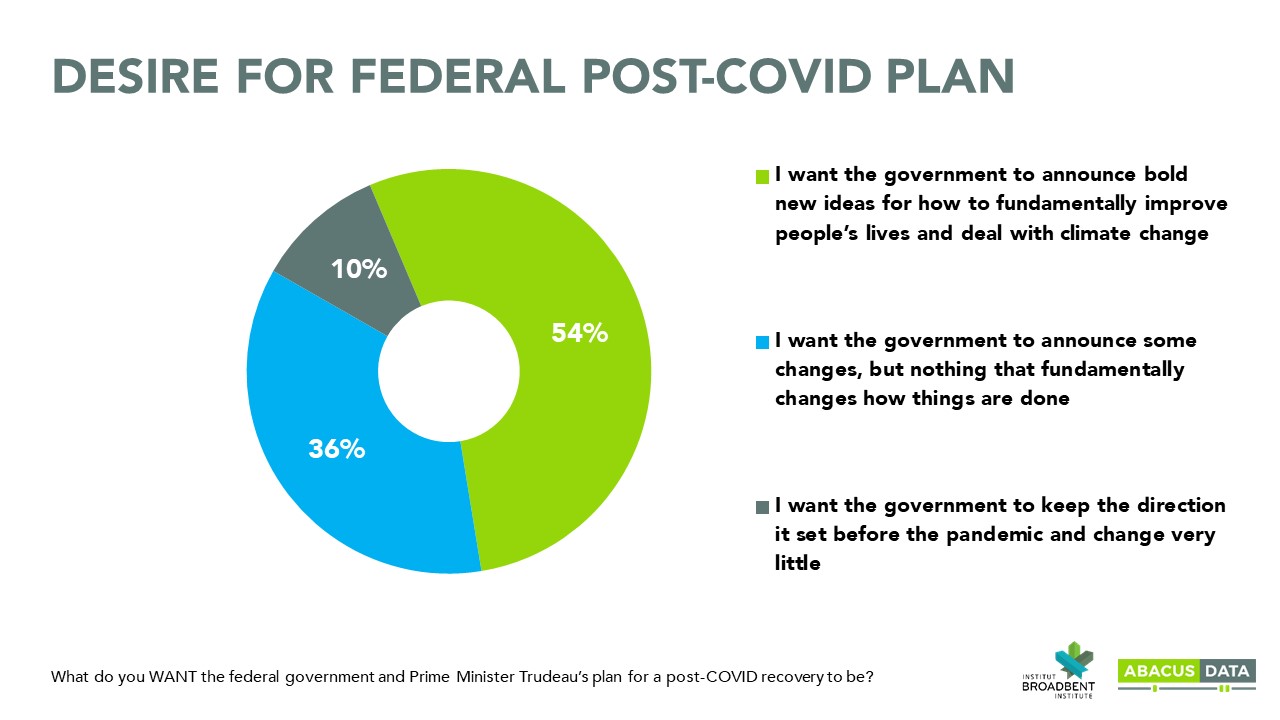
This view is consistent across the country, with half of those living in every region or province wanting bold new ideas from the federal government. There’s also some consistency across the political spectrum. 54% of Liberal voters want bold new ideas, 45% of Conservatives, 69% of Liberals, 74% of Greens, and 63% of BQ voters.
CANADIANS WANT A POST-COVID RECOVERY THAT PUTS PEOPLE FIRST.
There is a broad and deep desire from Canadians to see a post-COVID recovery agenda that helps make Canada more self-sufficient on key products, puts people first, improves public services, helps transition to a low-carbon economy, and forces the richest in Canada to help pay for the new investments.
We asked: “As the federal government prepares its agenda for Canada’s post-COVID recovery, tell us how important, if at all, the recovery effort meets the following criteria?”
Specifically, the survey found that a majority of Canadians say it is extremely or very important that the post-COVID recovery plan include:
• Help to build up Canada’s ability to produce key products like food and medical supplies domestically (74%).
• Invests in strengthening our health system including universal public pharmacare (70%).
• Focuses on helping people and doesn’t allow corporations to set the agenda and benefit the most from the recovery (67%).
• New laws and regulations are put in place to help protect vulnerable front-line workers for exploitation (63%).
• Giving municipalities the funding they need to continue to deliver core services and build infrastructure for the changing economy (63%).
• Increasing or creating new taxes on Canada’s richest people (60%).
• Ideas to ensure younger Canadians are not permanently set back because of the economic crisis (57%).
• A major focus to help Canada transition to a clean, low-carbon economy and deal effectively with climate change (54%).
• A plan to ensure affordable, high-quality childcare is available to everyone who needs it (47%).
[xyz-ihs snippet=”newsletter”
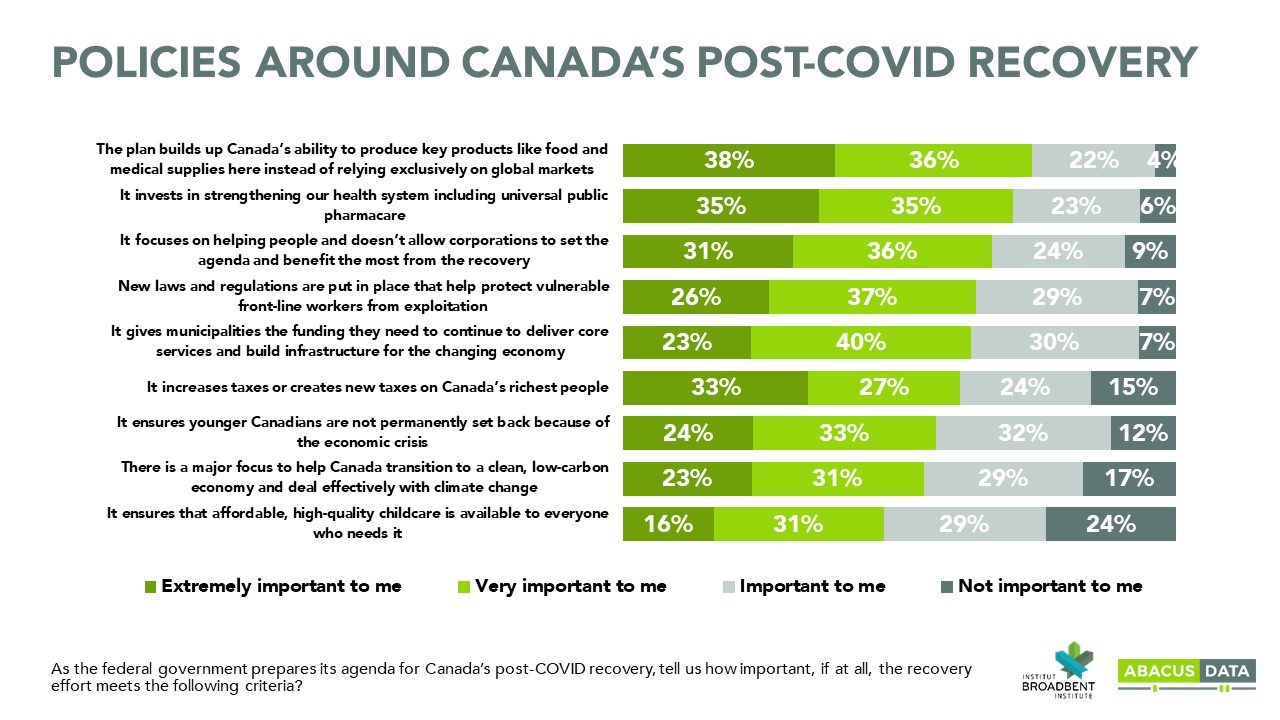
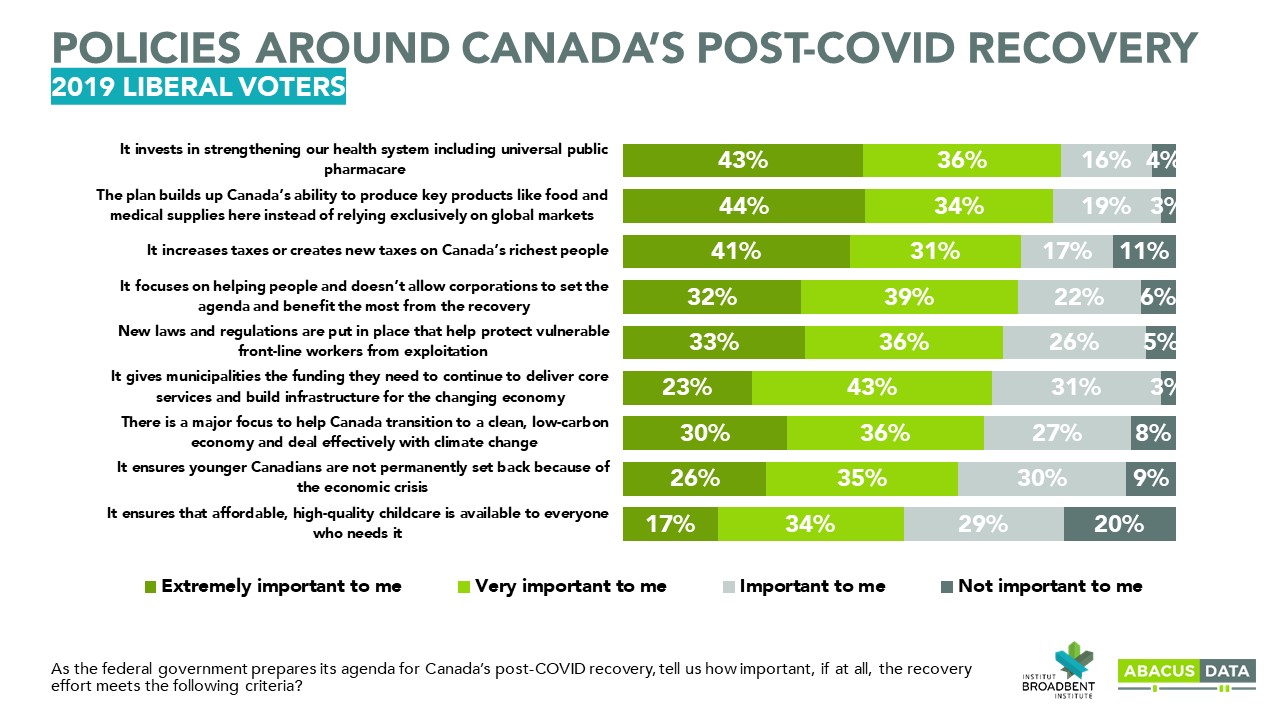
The survey also found broad support for a new wealth tax on the wealthiest multi-millionaires and billionaires in Canada and for a new tax on corporations who have made large profits during the pandemic.
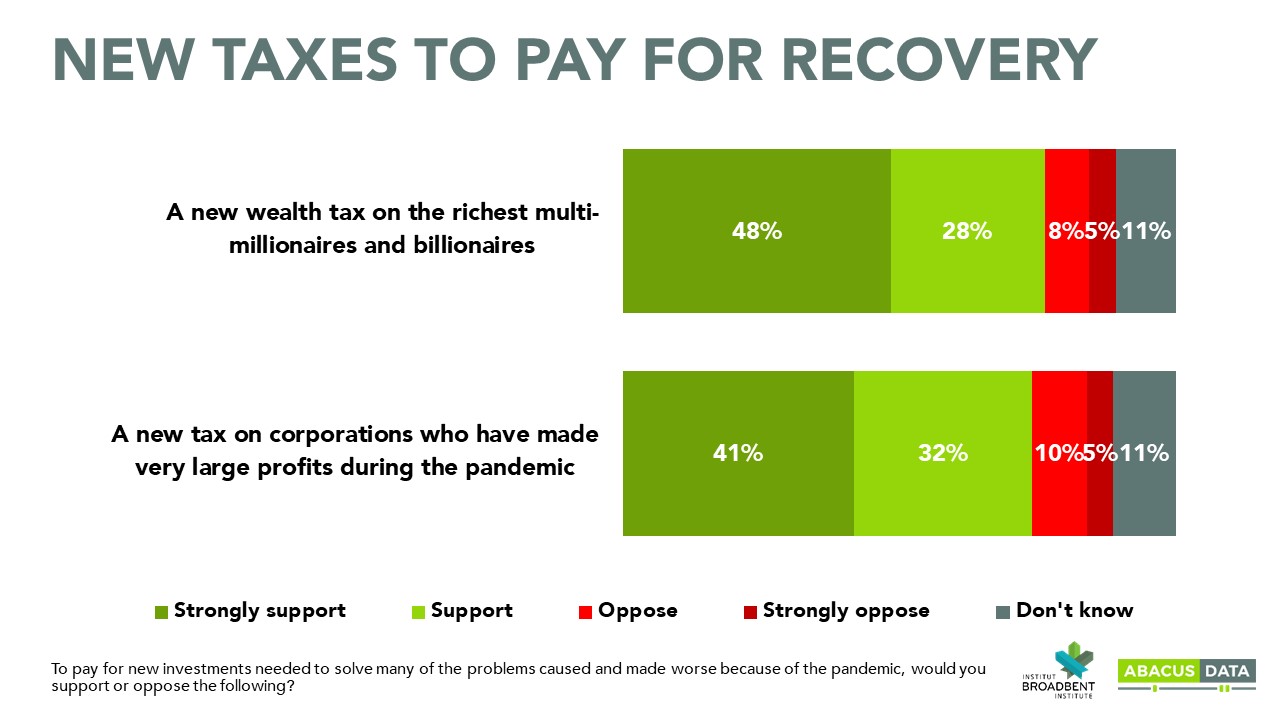
THERE IS POLITICAL RISK FOR THE LIBERALS IF THEY FAIL TO DELIVER BOLD, NEW IDEAS.
Among the 54% who want to see bold new ideas from the Liberal government’s post-COVID recovery plan, 49% say they will definitely not vote Liberal or probably not vote Liberal if they do not announce bold new ideas for how to fundamentally improve people’s lives and deal with climate change in the Throne Speech next week.
This includes 18% of those who voted Liberal in 2019 or about 10% of the entire electorate.
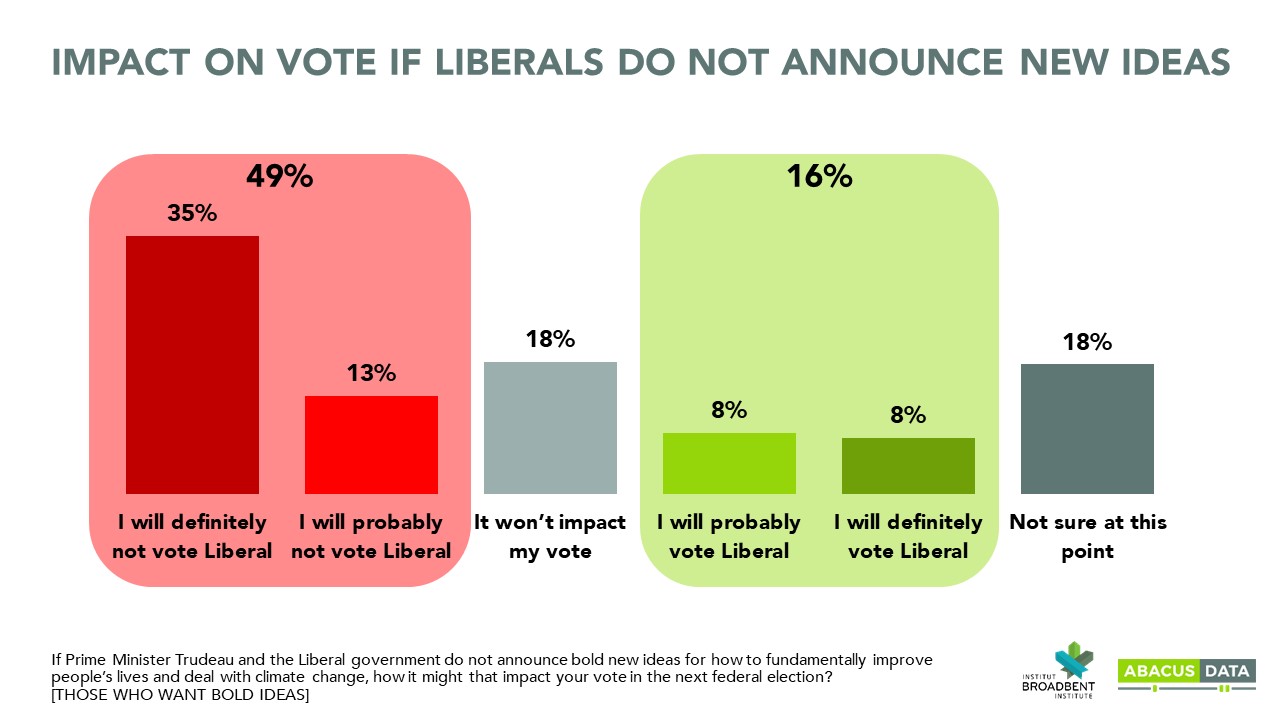
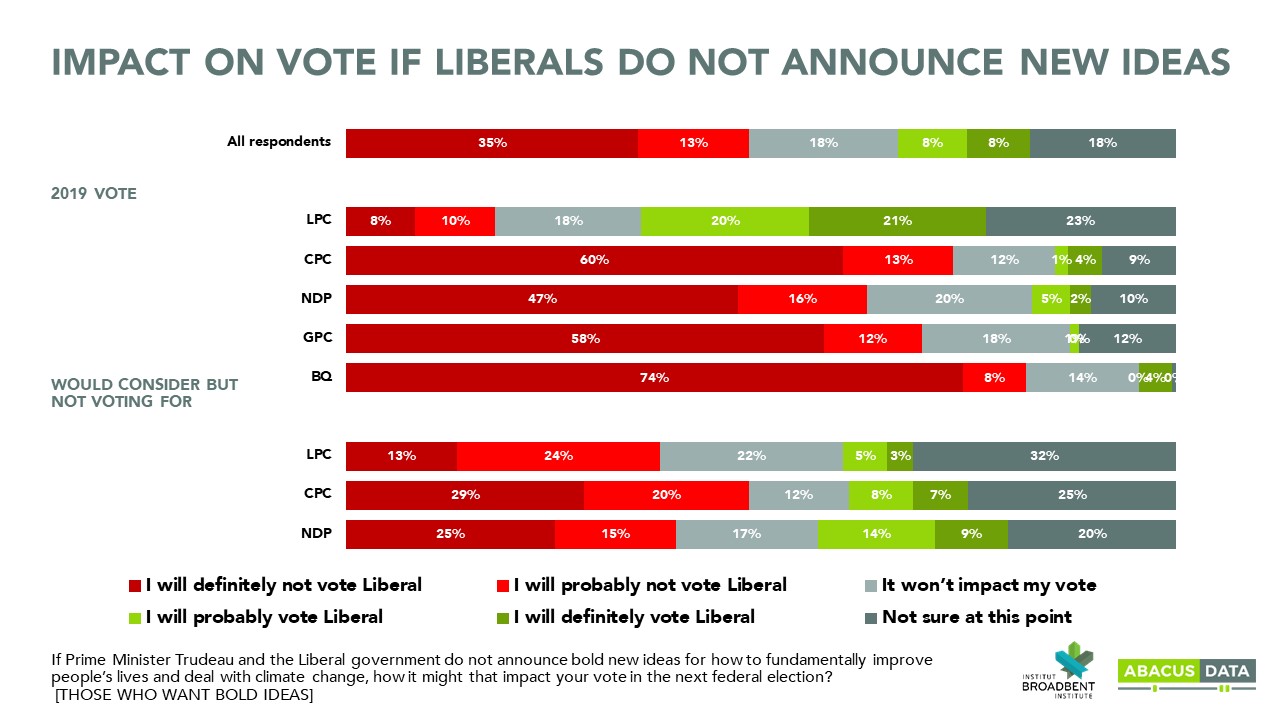
UPSHOT
The COVID-19 pandemic continues to cause widespread concern and anxiety for Canadians. Almost half still think the worst is yet to come, and most do not feel the economy will recover to pre-COVID levels within 12 months.
The pandemic has also highlighted many aspects of the economy and society that Canadians feel are not working right. Moreover, most recognize that the pandemic has made many aspects of life – from finding a good job, to preparing for retirement, to finding affordable housing – harder to achieve.
Given this, there is clear majority support for a post-COVID recovery plan that is bold and has new ideas to improve the problems the pandemic has exposed and to ensure that they do not happen again if another crisis like COVID-19 happens in the future.
Most say it is very important that the post-COVID recovery plan strengthens Canada’s production capacity to supply key products, that it strengthens the public health care system, and it helps transition the economy away from fossil fuels. There’s also a deep desire to see it put people, not corporations first, and for those with the most to help pay for the new investments.
The opinion environment is ready for a bold and progressive post-COVID plan. Most Canadians expect bold action from the government.
Download the full report with detailed tables
ABOUT ABACUS DATA
We are the only research and strategy firm that helps organizations respond to the disruptive risks and opportunities in a world where demographics and technology are changing more quickly than ever.
Find out more about what we are doing to help clients respond to the COVID-19 pandemic.
We are an innovative, fast-growing public opinion and marketing research consultancy. We use the latest technology, sound science, and deep experience to generate top-flight research-based advice to our clients. We offer global research capacity with a strong focus on customer service, attention to detail and exceptional value.
We were one of the most accurate pollsters conducting research during the 2019 Canadian Election.

Contact us with any questions.
Find out more about how we can help your organization by downloading our corporate profile and service offering.
METHODOLOGY
Our survey was conducted online with 2,000 Canadians aged 18 and over from September 4 to 9, 2020. A random sample of panellists was invited to complete the survey from a set of partner panels based on the Lucid exchange platform. These partners are double opt-in survey panels, blended to manage out potential skews in the data from a single source.
The margin of error for a comparable probability-based random sample of the same size is +/- 2.2%, 19 times out of 20. The data were weighted according to census data to ensure that the sample matched Canada’s population according to age, gender, educational attainment, and region. Totals may not add up to 100 due to rounding.



